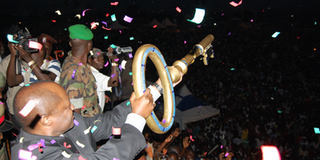Kabaka asks public to reject corrupt leaders

Kabaka Ronald Mutebi gestures with a key while ushering in the New Year at Lubiri, Kampala. PHOTO BY STEPHEN OTAGE
What you need to know:
Lessons from 2011. Kabaka Mutebi says the challenges of the past year have helped masses realise collective role in setting foundation for development.
Kabaka Ronald Muwenda Mutebi II has urged the public to exhibit a high level of civil assertiveness in 2012 to enable the country dispel “bad policies and corrupt leaders”.
In his New Year message, the Kabaka also noted that despite the many challenges the country faced in 2011, he is satisfied that the problems have helped the masses to realise their collective role in setting a firm foundation for the development of Uganda.
His strongly-worded message came on New Year’s Eve as majority of Ugandans ushered in 2012 with prayer, display of fireworks and a series of entertainment.
The Kabaka was on Saturday night speaking during a fete dubbed Enkuka organised by the kingdom at Lubiri Palace in Kampala.
“Our people can now make better decisions and know what they want. They have also realised that they should unite and fully participate in setting the country’s foundation for generations, a spirit which should continue,” Kabaka Mutebi said.
Buganda information minister Peter Mayiga yesterday said the Kabaka’s call is intended to encourage the public to reject bad policies, corrupt leaders and demand what rightly belongs to them.
Mr Mayiga said the country has experienced several setbacks, including the financial crisis, unemployment, lack of drugs and poor infrastructure due to “inept leadership”.
“People have now known their evils and how they come up.
The public knows that they lack drugs because of the corrupt regime, so they should rise up and fight corrupt leaders,” Mr Mayiga said. Last year, government faced massive walk-to-work protests spearheaded by Activists for Change, an opposition pressure group, to show discontent over the rising cost of living, poverty, corruption in the NRM government and alleged cases of torture.
The demonstrations saw a number of high profile opposition politicians being arrested and prosecuted. A number of protesters also died of gunshot wounds.
Criticised
Amnesty International, in a report released last year, accused government and public officials of placing illegitimate restrictions on freedom of expression and peaceful assembly to silence critical voices.
The relationship between Buganda and the central government has been lukewarm since the 2009 September riots that claimed 27 lives and saw at least 500 detained after the Kabaka was prevented from visiting Kayunga.
Since the Kabaka was enthroned in 1993, the kingdom has been pushing for the return of its property including land; official rent arrears amounting to at least Shs20 billion and estates that were seized by the post-independence government of the late Milton Obote, who abolished the monarchy in 1966.
“People should reject leaders who don’t respect their priorities. Why should someone choose not to pay legitimate demands of Buganda and pay (shoddy deals) Shs148 billion?” Mr Mayiga, in a veiled reference to the controversial compensation to businessman Hassan Basajjabalaba, asked.
The Kabaka last year called for power-sharing amid chants of “federo” from his subjects but negotiations with the central government have not yielded much in past years.




